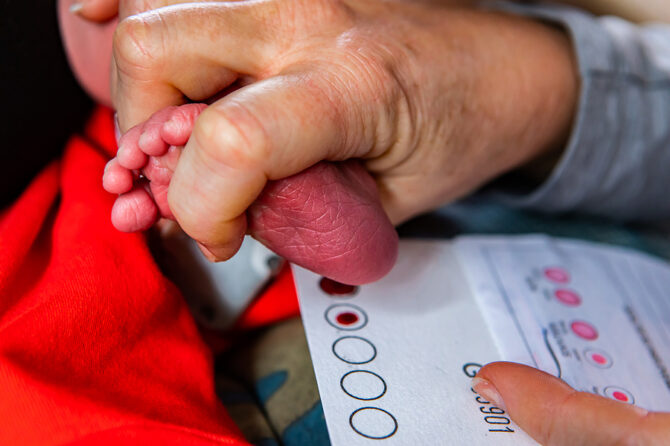
What is the Newborn State Screening test?
By: Joseph Mechak, MD
February 28th is ‘Rare Disease Day’. Rare Disease Day is an annual event to raise awareness and advocate for children and adults impacted by rare diseases. One important tool that we have in diagnosing certain rare diseases is the Newborn State Screen (NBS).
The NBS is quick, easy, and we often don’t spend much time talking about it because in the majority of cases the results are normal. However, this little test is very important, quite sophisticated, and a powerful tool for us to catch and treat rare diseases quickly.
I wanted to give the NBS it’s proper due and explain a little about what it is, why we do it, and why it is so important.
What is the Newborn Screen?
The newborn screen is a blood test that screens newborns babies for >40 rare but serious genetic or metabolic disorders. Most of these conditions will not have any overt signs or symptoms in the early weeks or months of life so would otherwise go undetected.
You may have also heard of this test referred to as a ‘PKU test.’ This is an outdated term that arose because a condition called Phenyloketonuria (PKU for short) was the first condition that babies were routinely screened for during the newborn period. This PKU screening birthed the newborn screening process and has led to the NBS as it is today.
What type of conditions are screened for?
The conditions included on the newborn screen will vary slightly from state to state. You may have heard of some of the conditions but most you have not. Most of the conditions are rare. The types of conditions vary widely but most are due to a gene mutation, missing enzymes or malfunctioning cellular machinery that can be harmful overtime.
For a condition to be included on the NBS, it has to meet the following criteria:
- The condition should be an important health problem that poses a significant health risk to the baby/child
- There is a test available for the condition
- There is an accepted treatment available and widely accessible
- Early detection and treatment is beneficial
- The benefits to babies/society are greater than the risks posed by the test.
Here is a list of conditions that are included on the Maryland newborn screen (Bonus points if you can pronounce them all!)
How and when is the Newborn Screen collected
The newborn screen is typically done once in the newborn nursery after your baby is 24 hours old. A second test is done around 2-weeks old in our office. We repeat the test because sometimes we are able to catch certain conditions when your baby is better fed and nourished. The test is performed using a heel prick to collect a small amount of blood onto specialized filter paper that is sent to the Maryland Department of Health Laboratories for analysis.
What happens if the Newborn screen in NORMAL
Nothing! Typically, no news is good news. We will receive a copy of the results from the Maryland Department of Health to keep on file. It usually takes 14 days or more for the NBS to be run and resulted.
What happens if the Newborn Screen is ABNORMAL
First, it is important to understand that the NBS is a SCREENING test, not a diagnostic test. Screening tests are meant to identify babies at risk for certain conditions not diagnose them. This also means that many times babies with abnormal newborn screens will turn out to have completely normal follow-up testing.
That being said, abnormal results are typically routed to three different places. First, the tests are all run and routed through the Maryland Department of Health. MDH will notify Potomac Pediatrics of any abnormal results and, when necessary, consult/involve a geneticist. These three players will make and communicate a follow-up plan to the parents. The plan can range from repeating the NBS, performing a more specialized/directed test, or in rare occasions, a visit to the geneticist or Emergency Room right away.
Where can I find more information about Newborn Screening?
Maryland Department of Health Newborn Screening
MDH – What is Newborn Screening?
Healthy Children Newborn Screening Tests










Most Commented